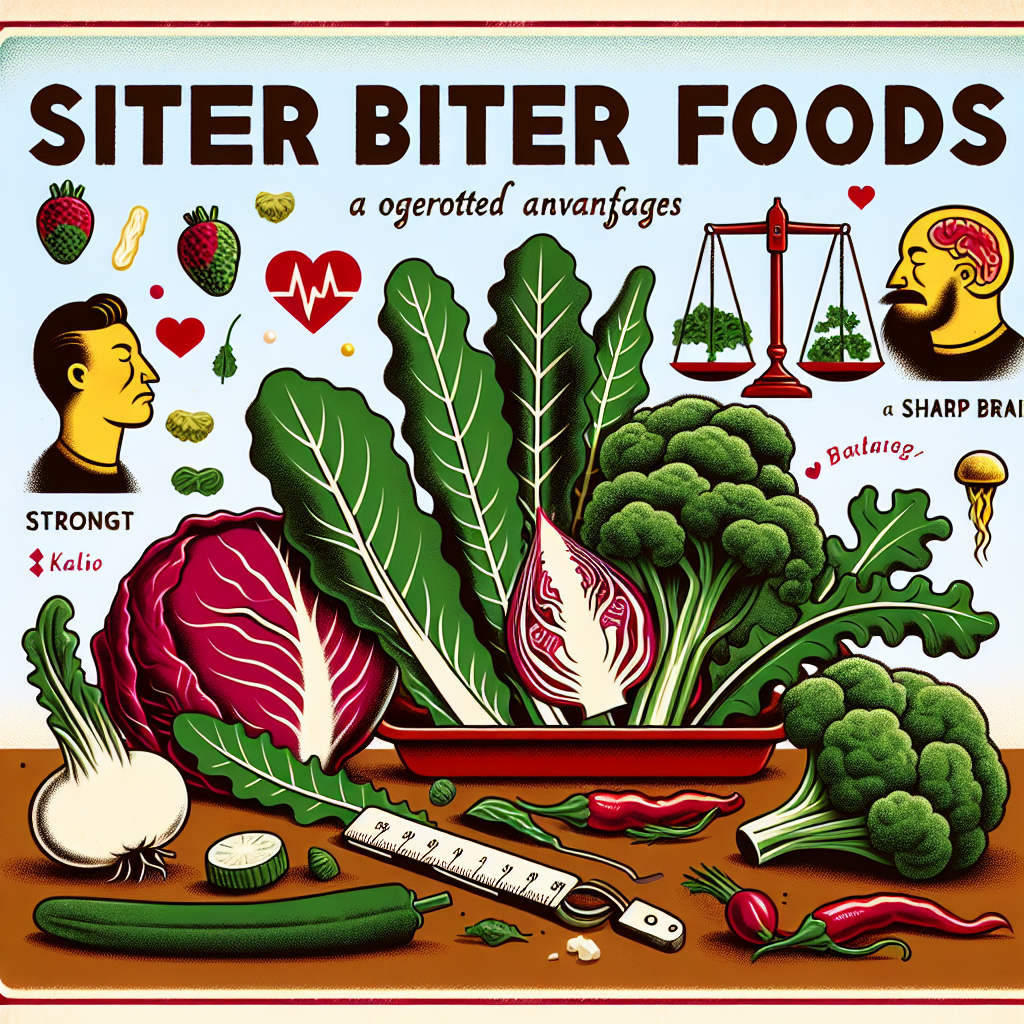The Forgotten Benefits of Bitter Foods

Discover the forgotten benefits of bitter foods! Uncover the health advantages that these unique flavors can bring to your diet. Visit My Vibrant Vitality now to learn more.
Rediscovering the Health Advantages of Bitter Foods
In the realm of gastronomy, bitter foods often take a back seat, overshadowed by the more popular sweet, salty, and savory flavors. However, these bitter foods, often overlooked and underappreciated, hold a treasure trove of health benefits that are worth rediscovering.
Bitter foods, such as dark chocolate, coffee, kale, and bitter melon, to name a few, are packed with a variety of nutrients that contribute to overall health and wellbeing. They are rich in vitamins, minerals, and antioxidants, which are essential for maintaining good health. Moreover, they are also low in calories and high in dietary fiber, making them an excellent choice for those who are watching their weight or trying to lead a healthier lifestyle.
One of the most significant health benefits of bitter foods is their ability to aid in digestion. The bitter taste stimulates the production of digestive enzymes, which help break down food and absorb nutrients more efficiently. This not only improves digestion but also helps prevent common digestive issues such as bloating, gas, and indigestion.
Furthermore, bitter foods are known for their detoxifying properties. They help cleanse the liver, the body’s primary detoxifying organ, by stimulating bile production. Bile is a crucial component in the detoxification process as it helps break down and eliminate toxins from the body. By incorporating bitter foods into your diet, you can support your liver’s function and promote overall detoxification.
In addition to aiding digestion and detoxification, bitter foods also have a positive impact on blood sugar levels. They contain compounds that can help regulate blood sugar and prevent spikes and crashes that can lead to fatigue, mood swings, and cravings for sugary foods. This makes bitter foods a beneficial addition to the diet of those with diabetes or those at risk of developing the condition.
Moreover, the antioxidants found in bitter foods have been linked to a reduced risk of chronic diseases, including heart disease and certain types of cancer. Antioxidants help neutralize harmful free radicals in the body, reducing inflammation and preventing cellular damage. This, in turn, can help protect against the development of chronic diseases and promote overall health.
Despite their numerous health benefits, bitter foods are often neglected due to their strong and sometimes off-putting taste. However, with a bit of creativity and an open mind, these foods can be incorporated into your diet in delicious and enjoyable ways. For instance, dark chocolate can be savored as a healthy dessert, while bitter greens can be tossed into salads or sautéed with garlic and olive oil for a tasty side dish.
In conclusion, the health advantages of bitter foods are too significant to be ignored. They offer a wealth of nutrients, aid in digestion and detoxification, help regulate blood sugar levels, and may even protect against chronic diseases. So, the next time you find yourself reaching for a sweet treat, consider opting for something bitter instead. You might just find that the benefits of these forgotten foods far outweigh their bitter taste.
The Overlooked Nutritional Value of Bitter Foods

Bitter foods, often overlooked in our modern diet, are a treasure trove of health benefits waiting to be discovered. The human palate is naturally inclined towards sweet, salty, and fatty foods, which are more palatable and comforting. However, this preference has led to the neglect of bitter foods, which are equally, if not more, beneficial for our health.
Bitter foods, such as dark chocolate, kale, coffee, and bitter melon, are packed with essential nutrients that our bodies need to function optimally. They are rich in vitamins, minerals, and antioxidants, which help to boost our immune system, protect our cells from damage, and reduce the risk of chronic diseases.
One of the most significant benefits of bitter foods is their ability to stimulate digestion. The bitter taste triggers the production of digestive enzymes in our stomach, which helps to break down food and absorb nutrients more efficiently. This can help to alleviate common digestive issues, such as bloating, gas, and indigestion.
Moreover, bitter foods are known for their detoxifying properties. They help to cleanse the liver, the body’s primary detoxifying organ, by stimulating bile production. Bile is a crucial substance that helps to remove toxins from our body and break down fats in our diet. By promoting bile production, bitter foods help to enhance liver function and improve overall detoxification.
Bitter foods are also beneficial for blood sugar control. They are typically low in sugar and high in fiber, which helps to slow down the absorption of sugar into our bloodstream and prevent spikes in blood sugar levels. This makes bitter foods an excellent choice for people with diabetes or those at risk of developing the condition.
Furthermore, bitter foods can help to curb cravings and promote weight loss. The bitter taste can help to suppress the appetite and reduce the desire for sweet, fatty foods. This can be particularly beneficial for those trying to lose weight or maintain a healthy weight.
Despite their numerous health benefits, bitter foods are often shunned due to their strong, sometimes unpleasant taste. However, with a little creativity and experimentation, they can be incorporated into our diet in delicious and enjoyable ways. For instance, dark chocolate can be savored as a healthy dessert, while kale can be added to salads, smoothies, or stir-fries. Coffee, on the other hand, can be enjoyed as a morning pick-me-up or an afternoon treat.
In conclusion, bitter foods are a valuable addition to our diet that should not be overlooked. They offer a wealth of health benefits, from boosting digestion and detoxification to controlling blood sugar and promoting weight loss. While their taste may take some getting used to, the health benefits they offer are well worth the effort. So, the next time you find yourself reaching for a sweet treat, consider opting for a bitter alternative instead. You might just discover a new favorite food and give your health a significant boost in the process.
Reintroducing Bitter Foods: Unveiling Their Hidden Benefits
Bitter foods, often overlooked in our modern diet, have a rich history and a plethora of health benefits that are worth rediscovering. The human palate is designed to taste five basic flavors: sweet, sour, salty, umami, and bitter. However, in today’s world, the bitter taste is often masked or avoided altogether in favor of more palatable flavors. This is unfortunate, as bitter foods offer a wealth of nutritional benefits that can contribute to a healthier lifestyle.
Bitter foods, such as dark chocolate, coffee, kale, and bitter melon, are packed with a variety of essential nutrients. They are rich in vitamins, minerals, and antioxidants, which are vital for maintaining good health. For instance, dark chocolate is known for its high antioxidant content, which can help protect the body against damage from harmful molecules called free radicals. Similarly, bitter melon is a powerhouse of vitamins A and C, which are essential for boosting the immune system and promoting skin health.
Moreover, bitter foods have been linked to improved digestion. They stimulate the production of digestive enzymes, which aid in the breakdown of food and the absorption of nutrients. This can help alleviate common digestive issues such as bloating, gas, and indigestion. Additionally, the bitter taste triggers the release of bile, which is crucial for the digestion and absorption of fats.
Furthermore, bitter foods can play a significant role in weight management. They are typically low in calories and high in fiber, making them a great choice for those looking to maintain or lose weight. The fiber content in these foods can help keep you feeling full for longer, reducing the likelihood of overeating. Plus, the bitter taste can help curb sugar cravings, as it provides a contrasting flavor that can make sweet foods seem less appealing.
Interestingly, bitter foods can also contribute to heart health. Many bitter foods, such as kale and other leafy greens, are high in potassium, a mineral that can help lower blood pressure. They also contain compounds that can help reduce inflammation, a key factor in many heart diseases.
Despite these benefits, the bitter taste can be a deterrent for many. However, it’s worth noting that the perception of bitterness can vary greatly among individuals, and it can be influenced by various factors, including genetics and diet. Moreover, the bitterness of these foods can often be balanced out with other flavors, making them more enjoyable to eat. For instance, the bitterness of dark chocolate can be offset by its natural sweetness, and the bitterness of kale can be tempered with a bit of lemon juice or a drizzle of olive oil.
In conclusion, bitter foods offer a multitude of health benefits that are often overlooked in our modern diet. They are rich in essential nutrients, can aid in digestion, contribute to weight management, and promote heart health. While their taste may be off-putting to some, with a bit of creativity and an open mind, these foods can be incorporated into a balanced diet in delicious and satisfying ways. So, the next time you come across a bitter food, don’t shy away. Embrace the bitterness and reap the health benefits it has to offer.